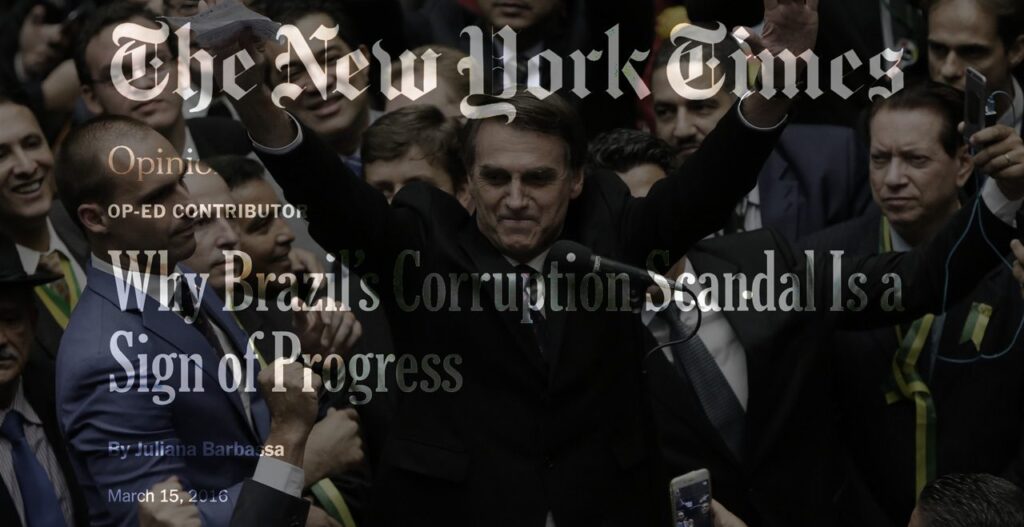Collusion Revelation: Challenging U.S. Media Silence on Brazil’s ‘Long Coup’
By Brian Mier
In a groundbreaking peer-reviewed article published in Latin American Perspectives on November 19, 2023, titled "Anticorruption and Imperialist Blind Spots: The Role of the United States in Brazil’s Long Coup," a group of scholars including Sean T. Mitchell, Rafael Ioris, Kathy Swart, Bryan Pitts, and myself present irrefutable evidence that the U.S. Department of Justice (DoJ) played a pivotal role in what we term Brazil’s "long coup." This period spans from the preamble to the contentious 2016 impeachment of Dilma Rousseff, through to the November 2019 release of then-former, now-current President Luiz Inácio Lula da Silva from political imprisonment.
“For over half a century, intervening against democratically elected governments has been only half the story,” the authors note. “The second half involves justifying, minimizing, or denying U.S. involvement.” The article takes U.S. scholars on Latin America to task for their oversight of substantial evidence of this involvement, urging a recommitment to the anti-imperialist tradition that has traditionally positioned their field as a critical bastion of informed critique against U.S. foreign policy.
Furthermore, the authors extend this call to U.S. journalists who were stationed in Brazil during this tumultuous period, urging them to break their silence about their government’s role in sidelining Brazil’s leading presidential candidate in the 2018 elections, thus paving the way for the election of right-wing extremist Jair Bolsonaro.
Collusion Revealed
For nearly five years, Brazil’s extensive anti-corruption campaign, known as Operation Car Wash (Lava Jato in Portuguese), was lavishly praised in U.S. media. Articles frequently portrayed Judge Sergio Moro as a gallant anti-corruption crusader, scarcely questioning the public prosecutors’ narrative. Judicial overreach went largely unchallenged even when prosecutors undertook actions like the illegal wiretapping of former President Lula da Silva’s defense attorneys, as reported by Consultor Jurídico on December 19, 2019.
This narrative began to fracture in 2019, thanks to a protracted series of articles in The Intercept, based on a substantial archive of hacked Telegram chats disclosed by hacker Walter Delgatti. These texts exposed the close collusion between the Operation Car Wash taskforce and Judge Moro, revealing their awareness of insufficient evidence to fairly prosecute Lula, a significant factor in his political imprisonment.
Four months after Lula’s release in November 2019, as the Covid-19 pandemic dominated headlines, The Intercept Brazil published an article on March 12, 2020, revealing that a team of 18 FBI agents, led by Special Agent Leslie Backschies, had been consistently meeting with the Car Wash taskforce for years. These U.S. agents coached Brazilian prosecutors on tactics, including using media leaks to tarnish Workers Party officials’ reputations and employing coerced plea bargains—a questionable practice widespread in the U.S. but less familiar in Brazil.
The Intercept article served as a culminating piece of evidence for Brazilian journalists challenging the official story of Operation Car Wash, although substantial proof already existed. For instance, in June 2019, Brazilian congressmember Paulo Pimenta presented a dossier to the European Parliament and some U.S. Democratic congressmembers, arguing convincingly that the DoJ was not merely a partner but was leading the investigation.
Hardly a Secret
The U.S. role in Operation Car Wash was not a clandestine matter requiring dogged investigative journalism to unearth. Between December 2016 and June 2019, the DoJ openly acknowledged its collaboration with Car Wash taskforce members via press releases and speeches, such as the one delivered by Acting Assistant Attorney General Kenneth Blanco at the Atlantic Council on July 19, 2017.
For example, a DoJ press release on December 21, 2016, celebrated the largest foreign bribery case ever settled in a U.S. court, levying $3.5 billion in fines on Brazil’s Odebrecht and Braskem companies. The release praised the collaboration between the FBI, DoJ Criminal Division, and U.S. Securities and Exchange Commission with Brazil’s Federal Public Ministry and Federal Police. This collaboration was also extensively covered in Brazilian media, such as an article by Estado de S. Paulo on May 21, 2016.
Despite these acknowledgments, the U.S. involvement in Operation Car Wash was conspicuously omitted in subsequent U.S. media coverage until February 26, 2021, in a New York Times op-ed by Gaspard Estrada.
Disappearing Connection
By the end of 2016, any observer closely following Brazil’s political developments should have been aware of the DoJ’s involvement in Operation Car Wash. Historical precedence of U.S. interference in progressive Latin American governments would logically incite a journalist to investigate this angle further. However, this was not the case. Through 2017, a year marked by significant socio-economic regressions implemented by the coup government and unprecedented judicial actions against Lula, U.S. media largely ignored Washington’s role.
During 2017, Acting Assistant Attorney General Kenneth Blanco gave a speech at the Atlantic Council, proclaiming the informal yet continuous communication between the DoJ and the Car Wash taskforce. In that same year, Glenn Greenwald, despite later exposing taskforce misconduct through The Intercept, praised the Car Wash taskforce in a keynote speech. Even New Yorker journalist Alex Cuadros, propped up to have a progressive stance, celebrated Lula’s politically motivated conviction.
The trend continued into 2019, as retrospective analyses of Brazil’s political turmoil still neglected to mention U.S. involvement. It wasn’t until April 3, 2022, documented by an article in FAIR.org, that Greenwald and other prominent journalists were critiqued for their prolonged silence on the DoJ’s role.
Too High a Career Cost?
The reluctance among Brazil specialists and numerous journalists to address the DoJ’s involvement raises crucial questions. It is implausible that they completely missed relevant publications and press releases. Instead, their evasion likely stems from a higher perceived career risk in revealing U.S. corruption compared to criticizing Brazil’s internal issues.
Journalists’ discretion, whether due to oversight or intentional omission, implicated them in perpetuating what Estrada deems “the biggest judicial scandal in Brazilian history.”
This article was originally published at FAIR and is reproduced with permission.
Become a Patron of BrasilWire.
